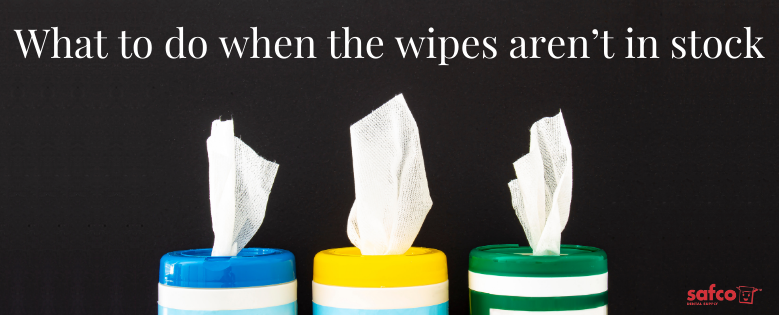|
Written by Amanda Hill |
Written On September 28, 2020 |

Normal. Each day as we head back into our ops we are working to find a sense of normalcy, but it feels like curveballs keep coming our way as we navigate the reality before us. The supply chain is one thing that has been keeping us on our toes since day one. At first, we couldn’t find hand sanitizer and face shields, then it was gloves and gowns, now it looks like our beloved disinfecting wipes have gone missing. Will we have to close our offices again? Don’t despair, there’s hope!
Supply Chain
First, let’s sink into why there are supply chain issues. Increased Demand for disinfection products is happening everywhere, not just in healthcare. Public places all over are clamoring to find products to wipe down surfaces to keep patrons safe. Then, the raw materials used to manufacture a plastic container full of wipes are in high demand for all sorts of other products, thereby slowing down supply. And lastly, there’s limited availability of shipping containers for products coming from overseas. So they could be sitting in a connex box on the other side of the ocean just waiting for their voyage.
What can’t we do?
Go old school
You’ve heard it said that necessity is the mother of invention, I want to encourage you here to not get too creative when it comes to disinfection. Just because you used to wipe down the operatory with alcohol-soaked 2X2s in the 80’s does not mean you can go back to that. Whatever protocol you decide to adopt it must involve a hospital-grade, EPA approved disinfectant that is used according to the manufacturer’s instructions For Use (IFU).
Make your own
I’m sorry to be the one to tell you this but you cannot make your own wipes. While it seems like the perfectly logical solution to this dilemma if it’s not part of the IFUs you can’t do it. Products are studied and tested before they are allowed to come to market using certain protocols. Using a product in a different way might not give you the desired result or potentially be harmful. According to OSHA, disinfectants should never be stored in containers with cotton gauze unless the gauze is used immediately. The cotton in the gauze may break down and chemically react with disinfectant, decreasing effectiveness. Some disinfectants are actually inactivated by the gauze.
What can you do?
Use an approved liquid disinfectant
Thankfully there are still liquid disinfectants available. While it does involve reading a new set of IFUs you can still properly clean and disinfect your room. More than likely you’ll have to go back to the good old spray, wipe, spray technique. Spray the surface with the disinfectant and wipe with paper towels or saturate a paper towel or gauze with disinfectant for sensitive areas or where overspray can happen and wipe to clean. Then disinfect those now cleaned surfaces with another spray or wipe. Allow surfaces to stay wet for the longest contact time on the label.
Minimize use with plastic barriers
Plastic barriers are a great way to save those few wipes you have left and to better keep irregular surfaces clean. No matter how hard you try, there’s no way to properly clean between all the keys of the keyboard or around those pesky buttons on the air-water syringe. So wrap those areas up to keep them clean and have one less thing to have to remember to spray, wipe, spray, and let dry. There are lots of different barriers available to fit different parts of your op. To properly use your barriers simply, remove the plastic barrier when disinfecting your room, inspect the area, and as long as it remains unsoiled you can place a new barrier after performing hand hygiene.
While “normal” isn’t something we’re going to see for a long time if ever, we can keep moving forward, adapting, and learning along the way. And while flexibility is useful, it is key to make sure that whatever changes are made to any protocol are based in science to keep everyone safe and our doors open to keep serving our patients.

Amanda Hill, RDH, BS has been in the dental industry for over 30 years, she earned her B.S. in Dental Hygiene at Old Dominion University in Norfolk, Virginia and has had the opportunity to experience dentistry around the world. Amanda has a love for learning and is obsessed with continuing education in all its many forms. Amanda practices part time clinically and is an industry educator for the nation’s largest dental job board, DentalPost.net. Amanda is a proud Navy spouse and mom of 3.